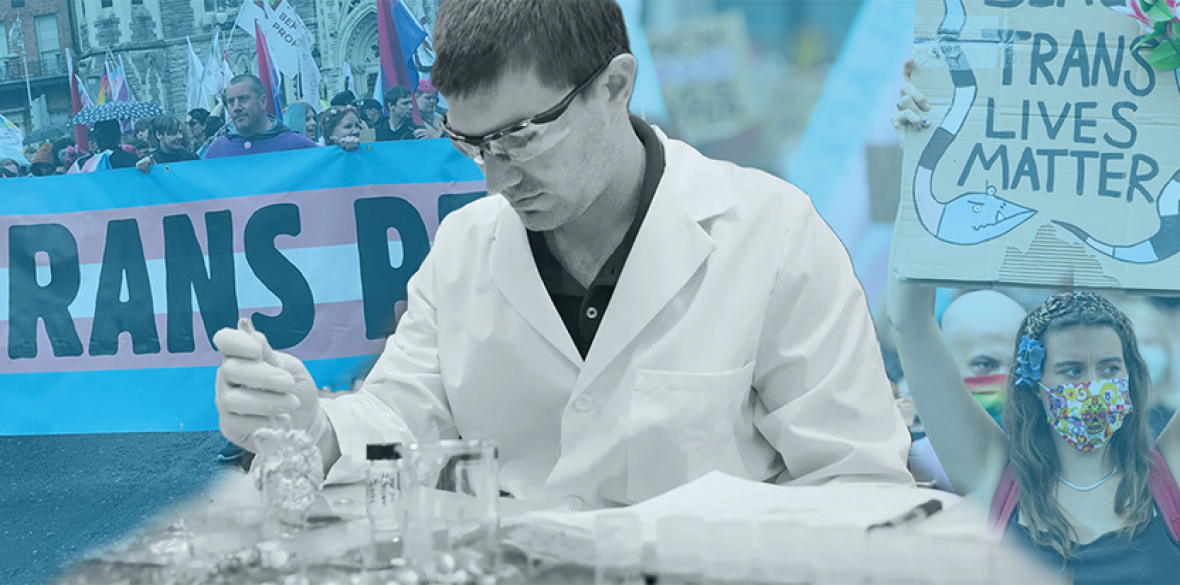This is the last article you can read this month
You can read more article this month
You can read more articles this month
Sorry your limit is up for this month
Reset on:
Please help support the Morning Star by subscribing here
BIOLOGICAL SEX is an important adaptive function for a vast number of plant and animal species. The recombination of genes during sexual reproduction allows fast adaptation by producing a kaleidoscope of new possibilities. Species that use sexual reproduction have sex gametes which divide up and recombine genes from each parent to produce a new organism.
Many species of plants and animals are also hermaphroditic. This means a single organism has both male and female sex cells, allowing for self-fertilisation where sexual reproduction does not require another organism. Other species convert between different sexes depending on their age, the sex of their peers, or their environment. Other species do not have different sexes at all.
The observation of nature is a fascinating resource to draw on when understanding ourselves as animals. We can observe both similarity and difference between ourselves and other organisms, whatever they are, as a function of our imagination and capacity to think through analogy.
The degree to which we let our biological empathy inform our reactions to other species is a fraught one. While we can find important and meaningful cultural uses for our understanding of nature, an over-investment in these human stories can blinker us to understanding creatures with no stake in them.
If we don’t empathise with animals, we can dismiss their pain and suffering. But if we fail to appreciate their animalness by anthropomorphising them, we fail to understand them at all. Biology is done in a human context. Sometimes biologists struggle to step outside of a human framework.
Humans are strange animals. We are not born into an empty world, but live in a mesh of biological, environmental, social and cultural networks.
Human sexual biology is an important feature of our species. It produces dimorphism in most people: that is, male or female sexual gonads. As for any biological system, there are and have been many people throughout history whose own physiological anatomy is not so clear-cut, but according to the frequent human tendency for categorising, humans identify two distinct sexes.
This tendency has not been benign in its treatment of intersex people historically and it still isn’t today. Whether the violent treatment of people that sit outside a systematised understanding of the world is the natural consequence of using categories, or a nasty and separate feature of human behaviour is beyond the scope of this article. Either way, there should be no place for the brutalisation of other people in the name of defending categories.
Another one of the horrific consequences of the identification of humans according to sex type is the oppression of women, staggering in its scale and scope. We cannot know how the first systematic violence and oppression against women, and the systematic debasement of their material wellbeing, began.
There is no way to disentangle this history to produce a counter-factual one. Many have hypothesised on the subject. The bearing of children is arguably the most dramatic material event that any human undergoes. Childbirth is still a major cause of maternal death in low-income countries, due to the entirely preventable lack of access to healthcare in an age of global inequality. Perhaps it is this moment of trauma and vulnerability that became the root of women’s oppression?
It’s certain that throughout history there have been many times and places where women have been reduced to their biology. A reasonable obsession with childbearing has produced an unreasonable obsession with women as only mothers. Women have been denied rights of all kinds by the spurious argument of their potential or actual social function as mothers.
Many strange social rules have grown up around claims about the nature of women and men. Elaborate social cultures of men’s and women’s gender construction have been established, morphed, swapped, revolutionised and persisted. The oppression of women has moved in lock-step, remaining central to intensely gendered society. Humans have created cultural conditions for ourselves where material realities, cultural and social treatment and personal identity form a huge gendered knot. This knot threatens us all with a denial of our humanity. It is also the structure of our society itself.
Treating women as a biological category is to misunderstand the way that gendered reality materially affects all of our lives, more powerfully and unfairly than just sexual biology would predict. It is the inextricably human constructions of women and men that have produced gendered violence, normative constriction and misogyny. The products of these social identities go far beyond the brutality of biological sex. Contrary to what some commentators would have you believe, there is no scientific basis for anti-trans dogma.
Coming to the question of womanhood as a biological definition is analogous to the mistakes made by biologists in misapplying human mores to the non-human world.
Women’s liberation does not make this mistake. Women's liberation means women can free themselves from the old idea that their destiny is defined by their biology. Women’s liberation also reclaims cultural womanhood for humanity and allows women to free themselves from the idea that their destiny is defined by their gender.
Women’s liberation frees us to live as human beings, but more extraordinarily than that, it frees us to stand in solidarity with other women and to work to end gendered inequality in healthcare, poverty, social power and physical and sexual violence.
Feminist liberation can treat childbearing and the ongoing disparity in women’s healthcare as central to women’s liberation, even though not all women have the same experience of it. Women who are unable or choose not to have children stand with those that do, against the lack of adequate maternal and gynaecological medicine and vice versa.
Women who have not experienced transphobia stand with those who have. Women who have not been intimidated and tortured by the use of gender in society would stand with those that have and those people stand with each other. Womanhood does not rest on biological definition, because oppression does not. Both are the products of human society and are no less real because of that. Feminist liberation is built solidly on the material reality of gendered oppression and fights to end it.
Feminist liberation is produced by women who stand in solidarity with one another and who identify, challenge and overturn women’s oppression and emancipate women from gendered violence. In doing so, women liberate us all.









